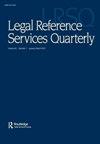来自编辑
Q4 Social Sciences
引用次数: 0
摘要
欢迎浏览法律参考服务季刊。在这一期中,我们重点关注法律信息和法律图书馆领域的三个关键问题。法律馆员张经纬在《用户参与虚拟参考服务:高校法律图书馆聊天参考调查》一文中介绍并讨论了她对疫情期间美国高校法律图书馆提供的聊天参考服务的研究。Zhang还建议,学术法律图书馆可以使用经济有效的工具来考虑将这些服务落实到位。民主的一个重要组成部分是公开获取公共信息。另一方面,许多政府资料由于被标记为机密信息而无法向公众公开。丽贝卡·查普曼(Rebecca Chapman)的《当门柱移动时》(When the Goalposts Move)详细介绍了行政命令的历史及其在政府信息分类方面的趋势。在她文章的深思熟虑的结论中,作者讨论了法律图书馆员在推动这一重要辩论中可能发挥的重要作用,无论是在理论上还是在实践中。“图书馆员作为模范思考者”专栏继续探索数据-信息-知识-智慧金字塔中的数据。讨论的重点是图书馆员和法律信息学者如何利用我们在元数据创建方面的集体专业知识,通过提高数据可访问性,帮助促进实证法律研究的可复制性。本文章由计算机程序翻译,如有差异,请以英文原文为准。
From the Editor
Welcome to Legal Reference Services Quarterly. In this issue, we focus on three critical issues in the realm of legal information and law libraries. Law librarian, Jingwei Zhang, presents and discusses her study on chat reference services offered in academic law libraries in the US during the pandemic in her article, “User-Engaged Virtual Reference Service: A Survey of Chat Reference in Academic Law Libraries”. Zhang also suggests cost-effective tools that academic law libraries could use to think about putting these services in place. An essential component of democracy is open access to public information. On the other hand, a lot of government materials are unavailable to the public because they are labeled as classified information. “When the Goalposts Move” by Rebecca Chapman gives a thorough history of executive orders and their trends in the classification of government information. In the thoughtful conclusion to her article, the author discusses the important roles that law librarians may play in moving this important debate forward, both in theory and in practice. The column “Librarians as Model Thinkers” continues to explore data in the Data-Information-Knowledge-Wisdom pyramid. The discussion centers on how librarians and legal-information scholars may help promote replicability in empirical legal research by improving data accessibility, drawing on our collective expertise in metadata creation.
求助全文
通过发布文献求助,成功后即可免费获取论文全文。
去求助
来源期刊

Legal Reference Services Quarterly
Social Sciences-Law
CiteScore
0.30
自引率
0.00%
发文量
13
期刊介绍:
An important forum for daily problems and issues, Legal Reference Services Quarterly will assist you in your day-to-day work as it has been helping other law librarians and members of the legal profession for over a decade. You will find articles that are serious, humorous, critical, or simply helpful to the working librarian. Annotated subject bibliographies, overviews of legal literature, reviews of commonly used tools, and the inclusion of reference problems unique to corporate law libraries, judicial libraries, and academic collections will keep you up-to-date on the continuously expanding volume of legal materials and their use in legal research.
 求助内容:
求助内容: 应助结果提醒方式:
应助结果提醒方式:


